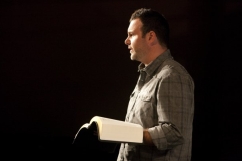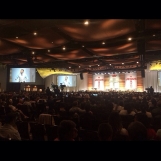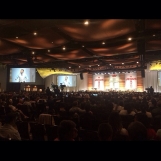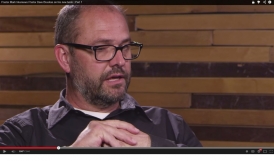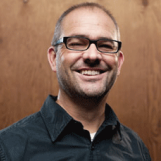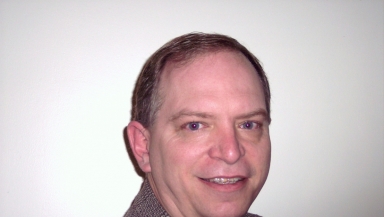
Mars Hill's former pastor Mark Driscoll thought of himself as "another Spurgeon" and ran the church like a business, according to the Pennsylvania college professor whose investigations have revealed the dark side of the Seattle megachurch.
Interviewed by Luke Norsworthy, Grove City college teacher Dr Warren Throckmorton reflected on the culture which developed at the church, which imploded spectacularly following a string of revelations. It is to close at the end of the year.
"The Mars Hill congregation, and Mark Driscoll and his handlers, spent a lot of time cultivating a brand," he told Norsworthy. "Mark Driscoll chastened his media and communications team for forgetting that he was the brand, and said they needed to spend more time promoting him.
"He went to conferences and said, this is how we do it at Mars Hill, and you should too. He wanted to build the largest church in the world."
However, Throckmorton said that he did not necessarily see Driscoll as a "bad guy". "People are complicated and they are subject to pressures of all kinds. You can see that the kind of situation he and his colleagues constructed would put pressure on most individuals to make the mistakes that he made.
"I don't necessarily see Mark Driscoll as being a particularly bad guy."
Throckmorton referred to the psychologists' term 'fundamental attribution error', which he explained as "where we attribute all the negative behaviours we see to someone's poor disposition or personality". He said: "The kind of situation he set up led him in ways many people would be seduced by."
Asked whether there were "elements of toxicity" in his character, Throckmorton – who stressed that he had never met Driscoll – said: "Some who do know him say that there were aspects of his character that were exploitable. That's probably true of most of us. We all have the same kind of weaknesses.
"Perhaps in his case those character issues were exploited more by the kind of situation he created, where there was a reciprocal relationship between the types of things he was seeking, that weren't godly or biblical, and the situation he created to bring that about. If you put yourself on a big screen in front of 15,000 people every week, it's pretty easy to believe how great you are."
Like other pastors of large congregations or multi-site churches, he said, Driscoll had created a situation where he had little engagement with ordinary members of his congregation. "He didn't have to meet many people or know many of the lay people. He came in through a private entrance, he had a place to wait, he preached his sermon and ducked out the back. A lot of mega-church pastors are like that. When you set up a situation where you are a spiritual performer, you probably go along with the persona."
Throckmorton said that one of the problems faced by Mars Hill was its results-driven culture. "When size and results matter, when there's a numerical or some kind of goal that takes the place of spiritual fruit – those can't be measured as well, but you can measure giving, you can measure numbers, and all of a sudden you start playing to that goal."
He continued, "It was well known among those that were subordinate to Driscoll that that's what they were looking for." Referring to the great 19<sup>th-century evangelist, pastor and social reformer, he said: "Driscoll thought of himself as another Spurgeon. He was very results driven." The church was run on a business model, Throckmorton said, to the extent that "they wanted to take over churches because there would be seats that would be empty that they could replace with giving units".
Asked about those who had left the church, he said that while some still felt secure in their personal faith, they "don't trust churches much". "Some say that Mars Hill created as many atheists as Christians because of the disillusionment people who were hurt there felt. As such the legacy of Mars Hill is kind of mixed, when you think of those who came away from the church feeling they had something, and thought they found Jesus there, and now they're not sure there is a Jesus."
Talking about what lessons could be drawn for the wider Church from the Mars Hill case, Throckmorton suggested that pastors should realise church growth was not necessarily about size. "If for whatever reason you live in an urban area, if there are a lot of people around and you get growth, that's good, but to seek it can be seductive.
"And really have people in your life that can just call you out if they really need to and be hard with you if necessary. I think in the beginning Reverend Driscoll did have some of those people in his life, but slowly but surely they went away or were sent away, and he really didn't have anyone in his life who could say, you're on the wrong course.
"I think over time a structure was set up that put Mark Driscoll in the spotlight and made him a star. Mars Hill got very big, very fast, and they lost sight of some of the people they were ministering to."
He concluded: "It's part of human nature – we'd all like to rule the world. One of the things Jesus was tempted with was that. We're all subject to that, I think, some more than others, but there's a bit of that in human nature and when we get power it can corrupt. Whether it's a church of 200 or 20,000, pastors have to be careful not to see it as their church. Mark Driscoll talked of 'my church'. It's not your church, it's Jesus' church, but it belongs to everybody, it belongs to everyone who goes there. If it's really going to be a community it has to be that."










